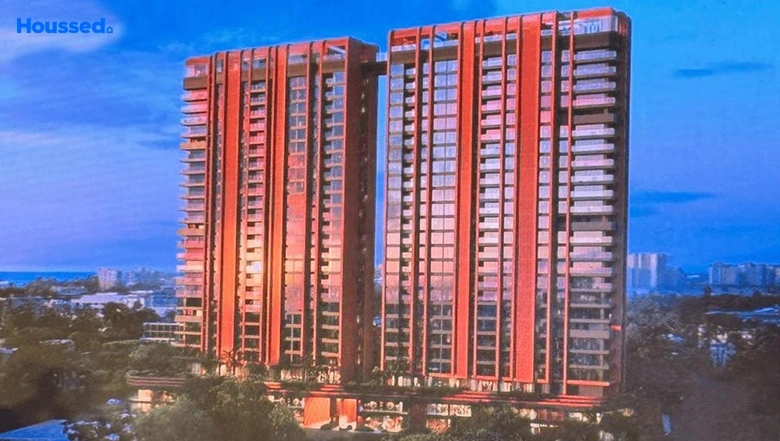Documents Required to Register Property in Maharashtra

Registering a property in Maharashtra requires a thorough check of essential documents to verify identity, ownership, and legal compliance. The sub-registrar’s office reviews every detail to ensure the transaction is valid, the title is clear, and state regulations are followed.
For first-time homebuyers, this process may seem complex. This guide provides a complete overview of the documents required to register property in Maharashtra, ensuring you are informed, confident, and fully prepared for a smooth registration experience.
List of Documents Required to Register Property in Maharashtra
1: Aadhaar Card (Buyer, Seller, Witnesses)
An Aadhaar Card serves as primary identity and address proof for the buyer, seller, and witnesses. Officials use it for biometric verification at the sub-registrar's office. Digital ID helps reduce forgery.
Maharashtra's Draft Registration Bill 2025 proposes mandatory Aadhaar-based checks during registration. You must bring both the original Aadhaar card and its photocopy. Ensure details match those on other IDs and forms to avoid delays.
2: Voter ID, Passport, Driving Licence
This secondary proof verifies the identity and address of individuals who do not have an Aadhaar or provide backup verification. It helps maintain cross-checks between all IDs, especially for non-residents.
3: PAN Card (Buyer, Seller, Witnesses)
As part of the documents required to register property in Maharashtra, the PAN card plays a crucial role, especially for property transactions exceeding Rs. 10 lakh. It helps the sub-registrar cross-verify identities and prevent tax evasion.
Each party involved in the sale must provide their PAN card or submit Form 60 if PAN is unavailable. Before visiting the office, ensure you carry the original PAN card along with two photocopies.
Even a minor mismatch in the name or PAN number can result in the rejection of the application and delays in registration.
Also Read - Property Registration in India
4: Passport‑Size Photographs (Buyer, Seller, Witnesses)
For the property registration process in Maharashtra, you need two passport-size photographs per person (buyer, seller, witnesses). The sub-registrar affixes these to relevant documents.
Photos must clearly show facial details and be recent (within the last 3 months). It helps identify signatories during biometric scans and interviews.
5: Sale Deed / Agreement to Sell
In Maharashtra, the sale deed is a mandatory document for property registration that legally transfers ownership after payment is made.
If the full amount isn't paid at the time of signing, the executed deed is treated as an agreement to sell.
This document is signed on the day of registration, after which the sub-registrar verifies the details and affixes the official stamps to complete the process.
6: Title Deed / Mother Deed / Previous Sale Deeds
The title deed establishes the ownership history of the property and helps ensure a clear and marketable title. For older properties, the Mother Deed or a chain of previous sale deeds is required to trace past ownership.
All parties must present the original documents along with two photocopies. During registration, officials carefully verify these deeds against the title details mentioned in the current sale deed to confirm legal ownership and avoid disputes.
7: 7/12 Extract (Satbara Utara)
The 7/12 Extract, also known as Satbara Utara, is a key land record document for rural properties in Maharashtra. It provides vital details such as ownership, survey number, mother-karta information, crop patterns, encumbrances, and liabilities.
For property registration involving rural land, carrying the latest extract (within the last 6 months), along with photocopies, is mandatory. The sub-registrar uses this document to ensure there are no legal disputes or liabilities and to verify land ownership.
8: Property Card / Malmatta Patrak
The Property Card (Malmatta Patrak) is crucial for registering urban properties in Maharashtra. It contains details like ownership, plot boundaries, tax liabilities, and survey number, serving as the urban equivalent of the 7/12 Extract.
A recently issued card (within the last six months), along with photocopies, must be submitted to confirm the accuracy of land records and ownership during the registration process.
Also Read - Property Documents Required in Real Estate
9: Encumbrance Certificate (EC)
Among the essential documents required to register property in Maharashtra, the encumbrance certificate confirms that the property has no outstanding loans, pending legal disputes, or registered liabilities for a specified time frame.
Buyers should obtain the EC for at least the last 13 years to ensure a clear title. Carry the original document and two notarised copies to assure the sub-registrar and the buyer that the property is free from any encumbrances.
10: No Objection Certificates (NOCs)
NOCs are often required to register property in Maharashtra, depending on the nature and location of the property. These certificates may be issued by the builder, housing society, municipal corporation, electricity and water departments, or environmental authorities.
It confirms that there are no pending dues, legal issues, or construction violations. All relevant NOCs must be attached to the sale deed and submitted during the registration process to ensure compliance and avoid delays.
11: Property Tax Receipt / Municipal Tax Bill
The property tax receipt or municipal tax bill confirms the seller’s ownership and ensures there are no outstanding property taxes. Carry the original receipt along with a photocopy to present during the registration process.
12: Completion Certificate (if applicable)
For new flats or recently constructed buildings, a completion Certificate (CC) is an essential document required to register property in Maharashtra. It confirms that the building has been approved by the authorities and is safe and ready for occupancy.
Submit this document along with the sale deed during registration. If unavailable, an NOC or a written undertaking from the builder should be provided to avoid legal or regulatory delays.
13: Approved Building Plan / Commencement Certificate
The municipal-approved building plan and commencement certificate are crucial for verifying that the construction complies with sanctioned norms and land use regulations.
These documents confirm that the project was initiated and developed in accordance with the approved plans. Submit the originals or certified copies during registration to ensure legal compliance.
14: Stamp Duty & Registration Fee Receipts
Among the key documents required to register property in Maharashtra, proof of payment of the stamp duty and registration fee is mandatory.
These payments can be made through GRAS (Government Receipt Accounting System) or in cash at authorised centres. The receipts must be presented during registration.
Buyers can purchase stamp papers online or at designated counters beforehand. In Maharashtra, the fee amount varies based on factors such as city, gender, and buyer category.
Also Read - Documents Required for Purchase of Property
15: Power of Attorney (If Transaction by Representative)
If the property transaction is being carried out by a representative, such as an NRI or absence of the owner, a Power of Attorney (POA) is required.
The POA must be notarised and registered to be legally valid. During registration, carry the original POA along with the identity proof of both the principal (property owner) and the authorised representative.
FAQ's
To register property in Maharashtra, the mandatory documents are:
- Aadhaar Card (Buyer, Seller, Witnesses)
- Voter ID, Passport, Driving Licence
- PAN Card (Buyer, Seller, Witnesses)
- Passport-Size Photographs (Buyer, Seller, Witnesses)
- Sale Deed / Agreement to Sell
- Title Deed / Mother Deed / Previous Sale Deeds
- 7/12 Extract (Satbara Utara)
- Property Card / Malmatta Patrak
- Encumbrance Certificate (EC)
- No Objection Certificates (NOCs)
- Property Tax Receipt / Municipal Tax Bill
- Completion Certificate (if applicable)
- Approved Building Plan / Commencement Certificate
- Stamp Duty & Registration Fee Receipts
- Power of Attorney (If Transaction by Representative)
Yes, officials use Aadhaar for biometric verification and digital ID. Maharashtra’s draft bill mandates it for both online and offline registration. If unavailable, an alternate ID may be allowed with additional verification.
Yes, a passport acts as secondary ID proof. However, Aadhaar may still be required for biometric clearance. Some offices accept a passport if you opt out of Aadhaar verification.
The 7/12 extract (Satbara Utara) is a land record document used in Maharashtra that provides key details, including the survey number, ownership information, crop details, and encumbrance status of a piece of land. It is mandatory when registering rural or agricultural land.
Yes, NOCs from the builder, society, and authorities confirm that the property is clear of dues and legal issues. Authorities require NOCs to allow transaction completion.
Yes, NRIs can register via a notarised and registered Power of Attorney (POA). The authorised representative must present the Power of Attorney (POA) and their identification to complete the registration.
Yes, Maharashtra offers e-registration via the IGR portal. However, in-person verification, document submission, Aadhaar thumb impressions, and biometric scans are still required.
Two passport-size photographs of both the buyer and the seller are required for property registration.
Yes, a Power of Attorney (POA) allows uploads and signing on behalf of the principal. It must be a registered and notarised document. The official scans the Power of Attorney (POA) and identification before processing.
Yes, you must bring original documents, such as your Aadhaar card, PAN card, sale deed, NOCs, and other relevant documents for verification. The Sub-Registrar's office returns the originals after checking them. You also need to submit two notarised photocopies of each document for official records.









